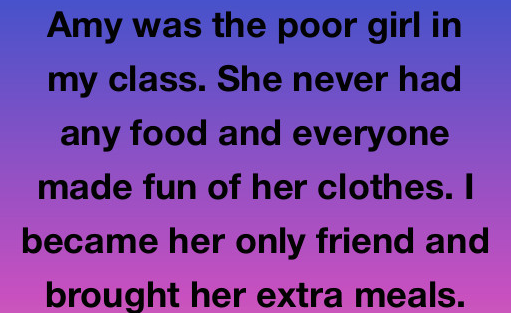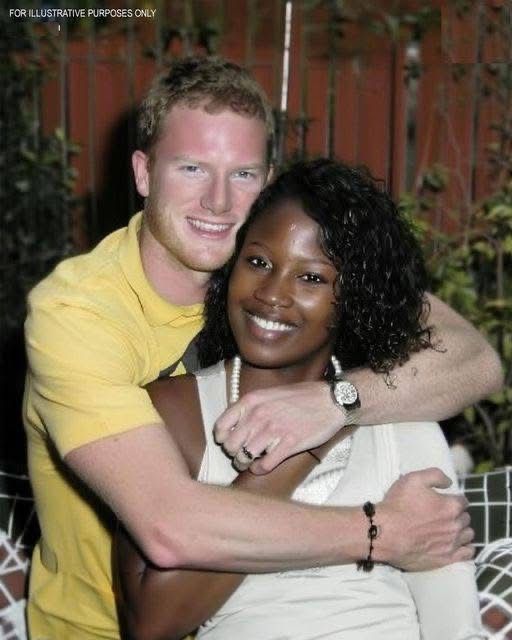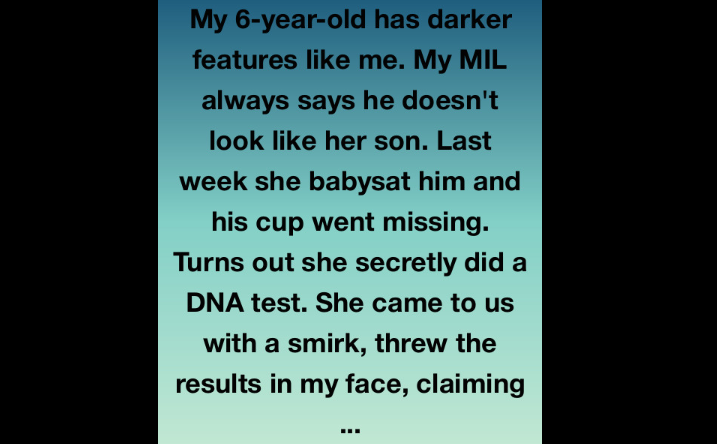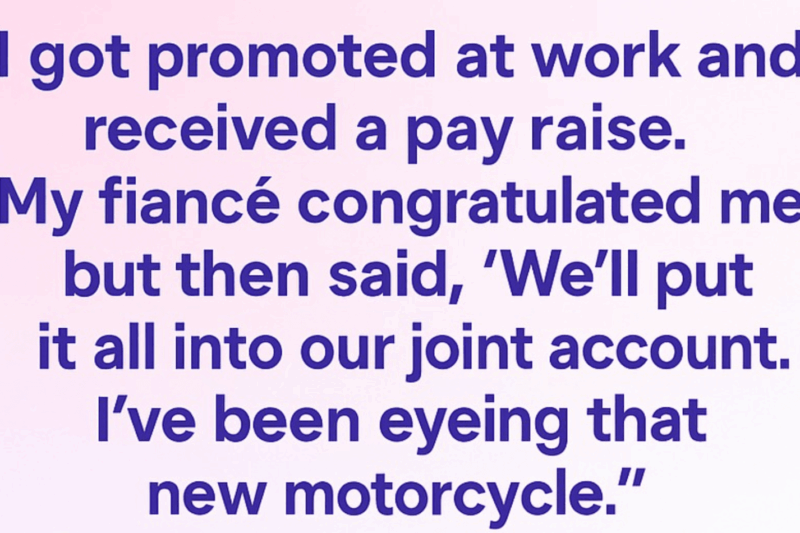In our classroom, Amy stood out as the girl with little means. Her lunches were absent, and her clothes drew unkind remarks from others. I chose to be her friend, sharing extra meals I brought from home. Then, one day, she was gone.
Years later—twelve, to be exact—I found myself in a hospital bed, recovering from surgery, an IV tethered to my arm. The room felt cold, the world hazy, until a nurse entered.
Her hair was neatly tied back, her name tag dangling from her scrubs. Something about her seemed familiar, though I couldn’t pinpoint it. Then she looked at me and said, “You’ll be fine, I promise. You helped me long ago… I’ve never forgotten.”
My heart stopped.
“Amy?” I whispered, struggling to believe it.
Her eyes glistened briefly before she nodded. “Yes, it’s me.”
The air seemed to vanish from my lungs. Words failed me, so she pulled a chair close and sat, as if we were kids again.
“You must’ve thought I vanished,” she said with a gentle smile. “In a way, I did. My mom got a job offer across the country, and we left suddenly, no time for goodbyes.”
Tears stung my eyes. “I kept asking about you. For weeks, I waited.”
Her smile softened. “I know. The teacher forwarded your letters. I read them all.”
I was stunned. Amy, the girl with worn-out shoes and no lunch, now stood before me—a nurse, poised, compassionate, and strong.
“How did you end up here?” I asked.
“It’s a long story,” she replied. “But it began with a cheese sandwich.”
And with that, we were back in fifth grade.
Amy had so little back then. Her backpack was tattered, her jacket too small, and I once saw her salvage a crumpled granola bar from the floor. It broke my heart.
So, one day, I packed an extra sandwich and gave it to her. She hesitated, but I insisted I wasn’t hungry—a small fib.
The next day, I brought more. My mom never questioned the extra food, and Amy accepted it with a soft “thank you.”
Classmates mocked her, throwing cruel names her way. I stood by her side. Some turned their taunts on me, but I didn’t mind.
Amy was reserved, but when she spoke, her humor, creativity, and intelligence shone. She loved to draw, and once sketched us on the swings with just a pencil. I kept that drawing tucked in my notebook for years.
Then, one Monday, she was gone. Her desk sat empty, and no one had answers.
“She moved,” the teacher said, offering nothing more. I wrote letters and left them at the office. Weeks later, a package arrived with my letters and a note in Amy’s handwriting:
“Thank you for seeing me when no one else did.”
That was the last I heard of her. Until now.
“I wanted to find you,” Amy said. “I searched online, but I couldn’t recall your last name until recently.”
“I looked for you too,” I admitted.
She grinned. “Well, now I’m your nurse for recovery. Get comfortable.”
“Really?” I asked.
“Yep. My shift’s just begun.”
I laughed, despite the post-surgery ache in my stomach.
Over the next few days, Amy cared for me, and we caught up on the lost years.
She shared how they lived in a motel for months after the move. Her mom juggled two jobs, and Amy worked part-time through high school to help.
“Scholarships got me through,” she said. “And one nurse saw something in me during my senior year. She covered my exam fees.”
“That’s amazing,” I said.
“Kindness returns,” she whispered.
I felt the truth of her words.
One afternoon, as she changed my bandage, a young patient’s cries echoed from the hallway. Amy paused, listened, then stepped out. She returned with a sticker, a juice box, and a warm smile.
“Still giving out food to lift spirits, huh?” I teased.
She laughed. “Some things don’t change.”
The next morning, my doctor cleared me to go home. Amy handled my discharge papers.
Before I left, she handed me a folded paper. “You might not remember this,” she said, “but you once wrote a list of things I was good at to cheer me up. You said I was more than what others saw.”
I unfolded it. The same list, faded but preserved.
“You kept this?” I asked.
“It reminded me I mattered. That someone believed in me when I didn’t.”
I stood there, unable to speak.
Then she asked, “Want to grab coffee sometime?”
“Absolutely,” I said, nodding.
Coffee led to dinner.
Dinner led to more outings—park walks, movie nights.
One evening, I found the courage to speak my heart. “You were my favorite person back then,” I said. “And I think you still are.”
She blushed. “You were the first to make me feel seen.”
We fell silent, holding hands as we walked.
For a time, life was simple and sweet. Amy worked her shifts, I returned to my job, and weekends were ours.
Then, a blow came.
Amy’s mom was diagnosed with pancreatic cancer. Late stage.
It shattered her. “I only just got her back,” she sobbed into my shirt one night.
Amy moved in with her mom to care for her. I visited often, bringing groceries, helping however I could.
Watching Amy tend to her mom with such patience and love moved me deeply.
One evening, on the porch after her mom slept, Amy asked, “Do you think life balances itself somehow?”
I nodded. “Yes. What you give, you receive.”
“Exactly,” she said, looking at me. “I got love when I needed it. Now I’m giving it back.”
Her mom passed peacefully weeks later.
At the funeral, Amy read a poem she wrote in high school about survival, hope, and unseen support. It left everyone in tears.
Afterward, Amy asked me to move in.
We found a cozy apartment with creaky floors and wide windows. Sundays were for cooking to old music. Thursdays, we debated crime documentaries.
Life felt real. Pure.
One day, Amy found her old sketch-filled notebook in the closet.
“Do you still draw?” I asked.
“Not much. I always felt I had to choose between art and surviving.”
“You don’t have to choose now.”
A week later, I enrolled her in a community art show.
She was furious at first, then anxious, then thankful.
Her sketch of her mom’s hands holding a paper lunch bag won first place.
A local gallery offered to showcase her work.
That moment shifted everything.
Amy began drawing again. More shows followed. Commissions grew. She cut back hospital shifts and started teaching art therapy.
She flourished.
So did we.
A year later, I proposed on the swing set from her childhood drawing.
She said yes.
At our wedding, I shared our story.
Of the girl with no lunch and too-big shoes. Of the cheese sandwich. Of the letters. Of the nurse who walked into my room and changed my life.
Guests laughed and wept.
Amy stood beside me, radiant.
“You saved me,” I said into the mic. “I didn’t realize it then, but you did.”
She whispered, “You saved me first.”
Now, we run a small art café.
Amy paints in the back. I brew coffee.
A sign by the door reads: “If you’re hungry, don’t hesitate. We’ve been there.”
We donate monthly to schools for art supplies and lunch programs.
No child should feel hungry or unseen.
Sometimes, kids come in, wearing hand-me-downs, eyes downcast.
Amy always sees them. She brings hot cocoa and a smile.
When I ask what she said, her answer is always the same:
“I told them they matter.”
Here’s the truth.
Life isn’t always kind.
But the kindness you share? It lingers.
It waits, patiently, until the moment is right to return.
Sometimes as a nurse. Sometimes as love. Sometimes as a second chance.
So be kind. Even when no one sees. Even when it feels small.
Because it matters.
It always matters.
If this story moved you, share it with someone who needs a reminder that kindness endures—and that even the smallest act can transform a life forever.




